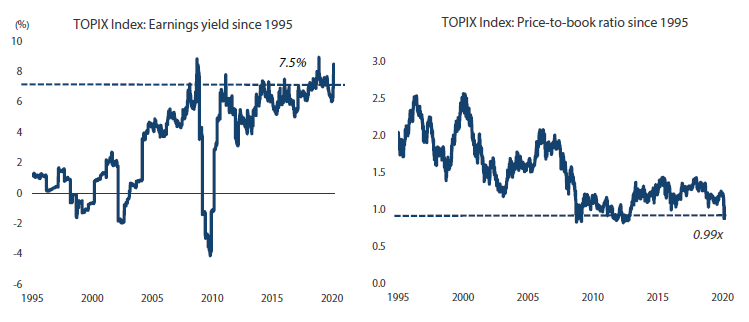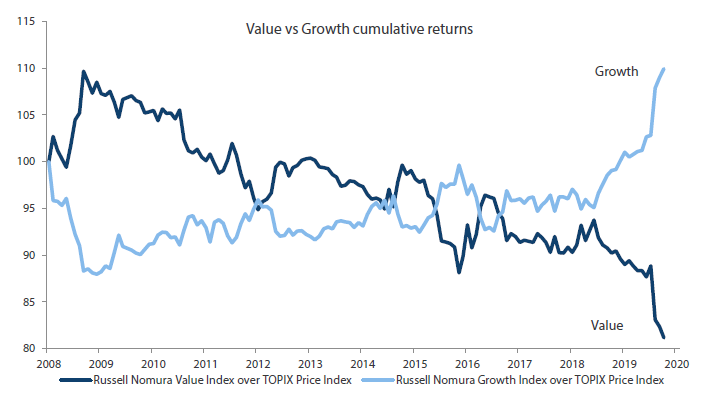This document is prepared by Nikko Asset Management Co., Ltd. and/or its affiliates (Nikko AM) and is for distribution only under such circumstances as may be permitted by applicable laws. This document does not constitute personal investment advice or a personal recommendation and it does not consider in any way the objectives, financial situation or needs of any recipients. All recipients are recommended to consult with their independent tax, financial and legal advisers prior to any investment.
This document is for information purposes only and is not intended to be an offer, or a solicitation of an offer, to buy or sell any investments or participate in any trading strategy. Moreover, the information in this document will not affect Nikko AM’s investment strategy in any way. The information and opinions in this document have been derived from or reached from sources believed in good faith to be reliable but have not been independently verified. Nikko AM makes no guarantee, representation or warranty, express or implied, and accepts no responsibility or liability for the accuracy or completeness of this document. No reliance should be placed on any assumptions, forecasts, projections, estimates or prospects contained within this document. This document should not be regarded by recipients as a substitute for the exercise of their own judgment. Opinions stated in this document may change without notice.
In any investment, past performance is neither an indication nor guarantee of future performance and a loss of capital may occur. Estimates of future performance are based on assumptions that may not be realised. Investors should be able to withstand the loss of any principal investment. The mention of individual securities, sectors, regions or countries within this document does not imply a recommendation to buy or sell.
Nikko AM accepts no liability whatsoever for any loss or damage of any kind arising out of the use of all or any part of this document, provided that nothing herein excludes or restricts any liability of Nikko AM under applicable regulatory rules or requirements.
All information contained in this document is solely for the attention and use of the intended recipients. Any use beyond that intended by Nikko AM is strictly prohibited.
Japan: The information contained in this document pertaining specifically to the investment products is not directed at persons in Japan nor is it intended for distribution to persons in Japan. Registration Number: Director of the Kanto Local Finance Bureau (Financial Instruments firms) No. 368. Member Associations: The Investment Trusts Association, Japan/Japan Investment Advisers Association.
United Kingdom and rest of Europe: This document is communicated by Nikko Asset Management Europe Ltd, which is authorised and regulated in the United Kingdom by the Financial Conduct Authority (the FCA) (FRN 122084). This document constitutes a financial promotion for the purposes of the Financial Services and Markets Act 2000 (as amended) (FSMA) and the rules of the FCA in the United Kingdom, and is directed at professional clients as defined in the FCA Handbook of Rules and Guidance.
United States: This document may not be duplicated, quoted, discussed or otherwise shared without prior consent. Any offering or distribution of a Fund in the United States may only be conducted via a licensed and registered broker-dealer or a duly qualified entity. Nikko Asset Management Americas, Inc. is a United States Registered Investment Adviser.
Singapore: This document is for information to institutional investors as defined in the Securities and Futures Act (Chapter 289), and intermediaries only. Nikko Asset Management Asia Limited (Co. Reg. No. 198202562H) is regulated by the Monetary Authority of Singapore.
Hong Kong: This document is for information to professional investors as defined in the Securities and Futures Ordinance, and intermediaries only. The contents of this document have not been reviewed by the Securities and Futures Commission or any regulatory authority in Hong Kong. Nikko Asset Management Hong Kong Limited is a licensed corporation in Hong Kong.
Australia:This document is issued in Australia by Nikko AM Limited (ABN 99 003 376 252, AFSL 237563). It is for the use of wholesale clients, researchers, licensed financial advisers and their authorised representatives only.
New Zealand:This document is issued in New Zealand by Nikko Asset Management New Zealand Limited (Company No. 606057, FSP22562). It is for the use of wholesale clients, researchers, licensed financial advisers and their authorised representatives only.
Kingdom of Bahrain: The document has not been approved by the Central Bank of Bahrain which takes no responsibility for its contents. No offer to the public to purchase the Strategy will be made in the Kingdom of Bahrain and this document is intended to be read by the addressee only and must not be passed to, issued to, or shown to the public generally.
Kuwait: This document is not for general circulation to the public in Kuwait. The Strategy has not been licensed for offering in Kuwait by the Kuwaiti Capital Markets Authority or any other relevant Kuwaiti government agency. The offering of the Strategy in Kuwait on the basis a private placement or public offering is, therefore, restricted in accordance with Decree Law No. 7 of 2010 and the bylaws thereto (as amended). No private or public offering of the Strategy is being made in Kuwait, and no agreement relating to the sale of the Strategy will be concluded in Kuwait. No marketing or solicitation or inducement activities are being used to offer or market the Strategy in Kuwait.
Kingdom of Saudi Arabia: This document is communicated by Nikko Asset Management Europe Ltd (Nikko AME), which is authorised and regulated by the Financial Services and Markets Act 2000 (as amended) (FSMA) and the rules of the Financial Conduct Authority (the FCA) in the United Kingdom (the FCA Rules). This document should not be reproduced, redistributed, or sent directly or indirectly to any other party or published in full or in part for any purpose whatsoever without a prior written permission from Nikko AME.
This document does not constitute investment advice or a personal recommendation and does not consider in any way the suitability or appropriateness of the subject matter for the individual circumstances of any recipient. In providing a person with this document, Nikko AME is not treating that person as a client for the purposes of the FCA Rules other than those relating to financial promotion and that person will not therefore benefit from any protections that would be available to such clients.
Nikko AME and its associates and/or its or their officers, directors or employees may have or have had positions or material interests, may at any time make purchases and/or sales as principal or agent, may provide or have provided corporate finance services to issuers or may provide or have provided significant advice or investment services in any investments referred to in this document or in related investments. Relevant confidential information, if any, known within any company in the Nikko AM group or Sumitomo Mitsui Trust Holdings group and not available to Nikko AME because of regulations or internal procedure is not reflected in this document. The investments mentioned in this document may not be eligible for sale in some states or countries, and they may not be suitable for all types of investors.
Oman: The information contained in this document nether constitutes a public offer of securities in the Sultanate of Oman as contemplated by the Commercial companies law of Oman (Royal decree 4/74) or the Capital Markets Law of Oman (Royal Decree80/98, nor does it constitute an offer to sell, or the solicitation of any offer to buy non-Omani securities in the Sultanate of Oman as contemplated by Article 139 of the Executive Regulations to the Capital Market law (issued by Decision No. 1/2009). This document is not intended to lead to the conclusion of any contract of whatsoever nature within the territory of the Sultanate of Oman.
Qatar (excluding QFC): The Strategies are only being offered to a limited number of investors who are willing and able to conduct an independent investigation of the risks involved in an investment in such Strategies. The document does not constitute an offer to the public and should not be reproduced, redistributed, or sent directly or indirectly to any other party or published in full or in part for any purpose whatsoever without a prior written permission from Nikko Asset Management Europe Ltd (Nikko AME). No transaction will be concluded in your jurisdiction and any inquiries regarding the Strategies should be made to Nikko AME.
United Arab Emirates (excluding DIFC): This document and the information contained herein, do not constitute, and is not intended to constitute, a public offer of securities in the United Arab Emirates and accordingly should not be construed as such. The Strategy is only being offered to a limited number of investors in the UAE who are (a) willing and able to conduct an independent investigation of the risks involved in an investment in such Strategy, and (b) upon their specific request.
The Strategy has not been approved by or licensed or registered with the UAE Central Bank, the Securities and Commodities Authority or any other relevant licensing authorities or governmental agencies in the UAE. This document is for the use of the named addressee only and should not be given or shown to any other person (other than employees, agents or consultants in connection with the addressee's consideration thereof).
No transaction will be concluded in the UAE and any inquiries regarding the Strategy should be made to Nikko Asset Management Europe Ltd.
MSCI: The MSCI information may only be used for your internal use, may not be reproduced or redisseminated in any form and may not be used as a basis for or a component of any financial instruments or products or indices. None of the MSCI information is intended to constitute investment advice or a recommendation to make (or refrain from making) any kind of investment decision and may not be relied on as such. Historical data and analysis should not be taken as an indication or guarantee of any future performance analysis, forecast or prediction. The MSCI information is provided on an “as is” basis and the user of this information assumes the entire risk of any use made of this information. MSCI, each of its affiliates and each other person involved in or related to compiling, computing or creating any MSCI information (collectively, the “MSCI Parties”) expressly disclaims all warranties (including, without limitation, any warranties of originality, accuracy, completeness, timeliness, non-infringement, merchantability and fitness for a particular purpose) with respect to this information. Without limiting any of the foregoing, in no event shall any MSCI Party have any liability for any direct, indirect, special, incidental, punitive, consequential (including, without limitation, lost profits) or any other damages. (www. msci.com).
Republic of Korea: This document is being provided for general information purposes only, and shall not, and under no circumstances is, to be construed as, an offering of financial investment products or services. Nikko AM is not making any representation with respect to the eligibility of any person to acquire any financial investment product or service. The offering and sale of any financial investment product is subject to the applicable regulations of the Republic of Korea. Any interests in a fund or collective investment scheme shall be sold after such fund is registered under the private placement registration regime in accordance with the applicable regulations of the Republic of Korea, and the offering of such registered fund shall be conducted only through a locally licensed distributor.




